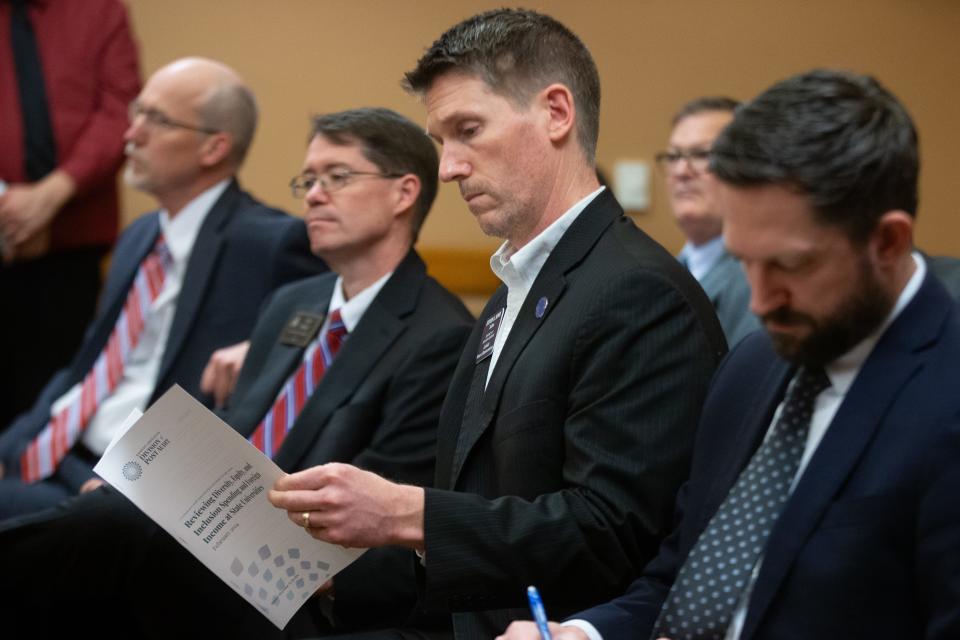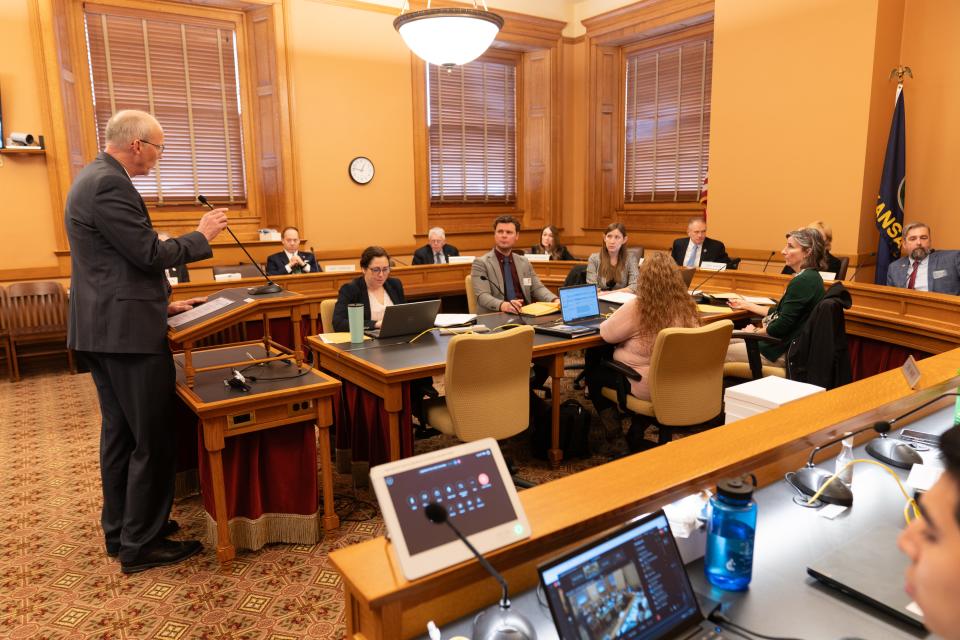Here's what auditors found on diversity, equity, inclusion spending at Kansas universities
Kansas universities spent $9 million in taxpayer money on diversity, equity and inclusion efforts last school year, a sum first reported last week by state auditors directed by lawmakers to study the issue.
The nonpartisan Kansas Legislative Division of Post Audit reported that the six state universities collectively spent $45 million in total on DEI-related activities, of which $9 million of that was from state funding.
Auditors also studied foreign money at universities, though lawmakers spent far less time discussing that portion of the audit. The six universities collectively reported $116 million from foreign funding sources.
What did the audit show about DEI spending at Kansas universities?
During the 2022-23 academic year:
The six universities collectively spent $2.8 billion. Of that, $45 million was on DEI-related activities.
Out of $742 million in state appropriations, $9 million went to DEI activities.
Salary and benefits of faculty and staff accounted for 97% of that $9 million. While some staff may have been directors or administrative assistants in offices with 100% of their time dedicated to DEI-related activities, also included were student employees, mental health counselors, teaching staff and other workers who work part-time on such efforts. The auditors did not include classroom activities.
A small share of the spending was for expenses like travel for student recruitment, software for English language skills and trainings such as for cultural competency or sexual harassment.
What did the audit show about foreign funding at Kansas universities?
During the 2022-23 academic year:
Of the $116 million from foreign funding sources, $111 million was for student tuition and fees. That includes money paid by individual foreign students or their parents, as well as tuition paid for by foreign universities or governments.
Foreign contracts accounted for $5 million, such as for aircraft safety assessments and medical research.
Foreign gifts accounted for $113,000.
The foreign funding came from a total of 170 countries. India and China together accounted for half of that, largely due to tuition and fees. The United Kingdom and Switzerland had the most money tied to contracts, while Canada and Sweden had the most money tied to gifts.
Why did the Legislature audit university DEI expenditures?

The audit was requested by Rep. Steven Howe, R-Salina, who chairs the House Higher Education Committee and has taken issue with university diversity, equity and inclusion efforts. He attended the audit presentation, but didn't speak during it.
Howe attempted to get similar information last year through letters sent by the Kansas Legislative Research Department.
More: Kansas lawmakers seek university funding info on diversity, equity, critical race theory
He told the committee on April 25, 2023, when requesting the audit that the 76-page report he got back was not what he was looking for.
"I've never said diversity, equity and inclusion is good; I've never said it's bad," Howe said. "I'm not one to make a judgment on it.
"But I do know it is a very hot topic around the United States at different institutions of higher education, and what I do know is that not all of these initiatives are created equally, or treated or implemented equally. So I want to look under the hood of the state universities and see what's actually going on, how big of a footprint are the universities do they have with diversity, equity and inclusion so we can make informed decisions as a legislative body."
Howe said at that the time that "I could have pursued a much more aggressive track in Higher Education Budget, but I chose not to because I want to get information."
More: State budget will limit diversity efforts at Kansas universities. Here's what else is included.
What does 'DEI' mean?
The auditors noted that DEI has a broad interpretation. While universities may have dedicated diversity and inclusion offices and staff, they also use the term for long-standing efforts to provide services to military veterans, international students and students with disabilities.
The Kansas Board of Regents noted in its response to the audit that it has not adopted any policies about DEI-related activities and instead has told universities "to improve student retention and graduation rates for every demographic."
University of Kansas chancellor Douglas Girod was the only university leader to send a written response to the audit. He said KU believes it has a responsibility for every student to feel "a sense of inclusion and belonging." He credited "our commitment to supporting students of all backgrounds" with the university's record enrollment and improved retention.
"We know this has a direct effect on student enrollment, retention, and success, which is why we have made the investments shown in the report," Girod wrote. "These are investments in first generation students, Pell-eligible students, military and veteran students, students with disabilities, students who identify with underrepresented populations, and any student who enrolls at KU and seeks additional support to be successful in their academic career."

To the frustration of some legislators, the universities largely do not have a measure for whether DEI efforts are successful or can show a return on investment.
In order to have a consistent definition for auditing purposes, the auditors asked for expenditures related to any activity or service to "support students who may not have the same opportunities to succeed as other students."
Audit supervisor Heidi Zimmerman said their definition of DEI was based on feedback from the universities and intended to ensure responses were consistent.
"It's broad because there's no agreement," she said. "Talk to different people, they'll all give you different answers."
Rep. Jason Probst, D-Hutchinson, agreed with the broad definition, calling it a new label for efforts that have been going on for several years, like disability accessibility decades ago.
Sen. Mike Thompson, R-Shawnee, contended "this DEI acronym started being used for a specific reason" and that it is not "broad and encompassing." Rep. Kristey Williams, R-August, suggested that DEI is "creating a divide" and results in "unequal treatment of students."
"Most of the universities told us that many services are open to all students," Zimmerman said. "However, universities did report some programs that serve specific student groups. So for example, many universities reported providing services related to military and veteran students, as well as first generation college students."
Sen. Caryn Tyson, R-Parker, asked whether DEI-related spending on a food pantry meant people would have to "meet certain parameters before you can participate in their food, are they discriminating, basically?"
Zimmerman said they did not looks into such rules.
"The universities told us that most services were open to all students, but they did also note that some types of students might access certain services more often," she said. "So for example, students from a disadvantaged background might access that pantry a little more often than other students. But they didn't tell us that it was closed to anybody."
Jason Alatidd is a Statehouse reporter for the Topeka Capital-Journal. He can be reached by email at jalatidd@gannett.com. Follow him on X @Jason_Alatidd.
This article originally appeared on Topeka Capital-Journal: What lawmakers found when auditing DEI spending at Kansas universities

